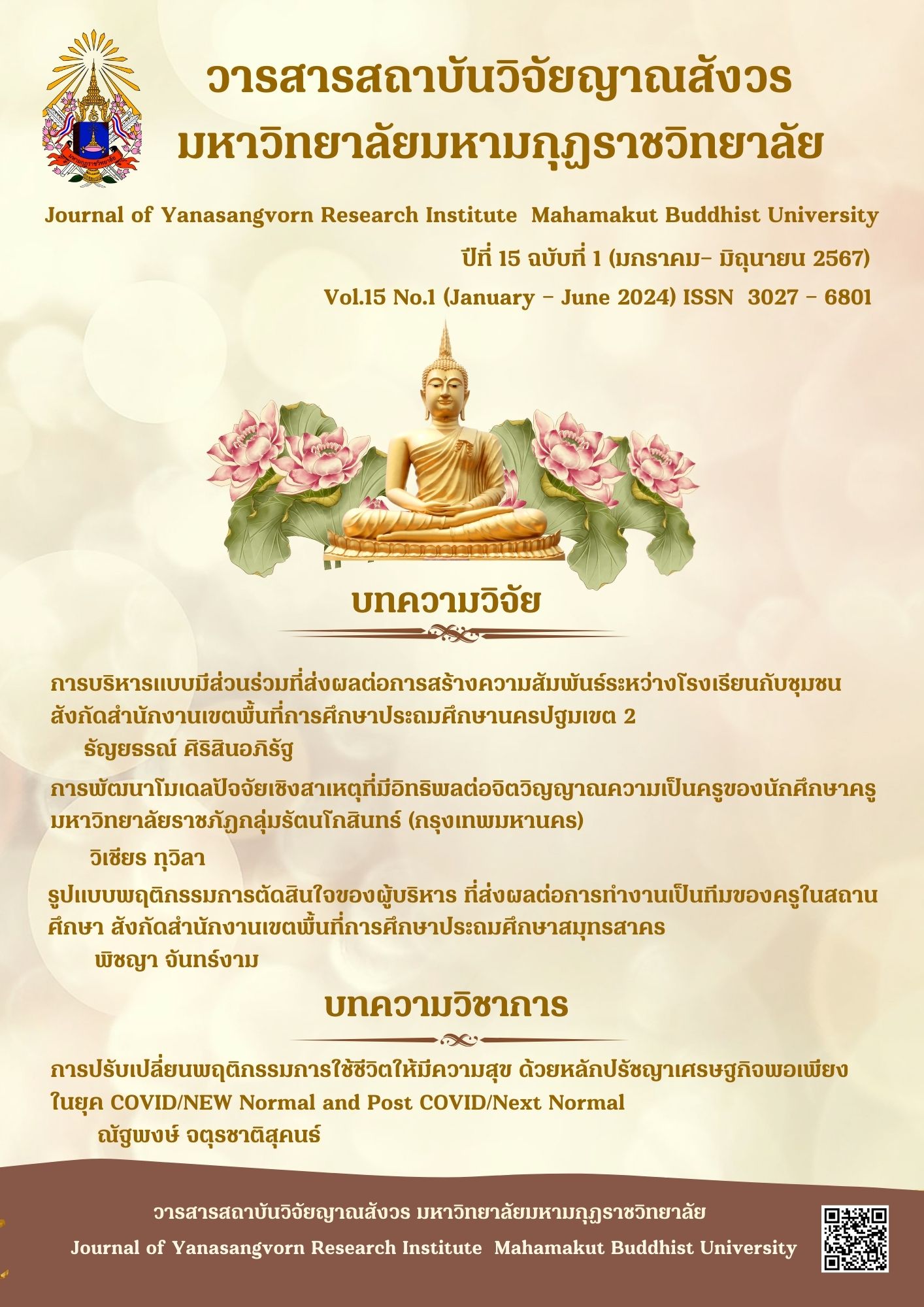THE DEVELOPMENT OF A CAUSAL FACTORS MODEL INFLUENCING TO TEACHER SPIRITUAL FOR TEACHER STUDENTS OF RAJABHAT
Main Article Content
Abstract
This research’s objectives were to study; 1. the level of causal factors that influence to teacher spiritual, 2. the level of teacher spiritual of teacher students, 3. the relationship between the causal factors that influence teacher spiritual, and 4. consistency of the model of causal factors. The sample group was 322 teacher students of Rajabhat University, Rattanakosin Group (Bangkok). Research instrument included questionnaires. The statistics used frequency, percentage, mean, standard deviation, Pearson correlation Coefficient and Path analysis with the LISREL program. The research results were as follows:
1.The level of causal factors that influence teacher spiritual of teacher students overall was at a high level. 2. Teacher's spirituality level of teacher students overall was at a high level. 3.The correlation coefficients between all influential causal factors were positively related to the spiritual of teacher students with statistical significance at the 0.01 level. 4. Structural relationship model of causal factors influencing teacher spiritual of teacher students showed the consistent with empirical data. By personal characteristics Intentions in choosing to pursue the teaching profession, in the educational environment, relationships with teachers, and teacher spiritual of student teachers showed the aspect of being a good role model for students was given the most importance, showed the power in predicting teacher spiritual of teacher about 90.00 percents.
Article Details

This work is licensed under a Creative Commons Attribution-NonCommercial-NoDerivatives 4.0 International License.
References
กัตติกา ภูหานาม, และ สมพงษ์ พันธุรัตน์. (2561). การพัฒนาแบบวัดและเกณฑ์จิตวิญญาณความเป็นครูของนักศึกษาคณะศึกษาศาสตร์และครุศาสตร์. ใน ดร. สาคร สร้อยสังวาล, การประชุมวิชาการนา เสนอผลงานวิจัยระดับชาติ เครือข่ายบัณฑิตศึกษา มหาวิทยาลัยราชภัฏภาคเหนือครั้งที่ 17 "บูรณาการงานวิจัยสู่การพัฒนาท้องถิ่นที่ยั่งยืน". พิษณุโลก: บัณฑิตวิทยาลัย มหาวิทยาลัยราชภัฏพิบูลสงคราม.
ปิยะวัฒน์ กรมระรวย. (2560) โมเดลเชิงสาเหตุปัจจัยที่ส่งผลต่อจิตวิญญาณความเป็นครู (วิทยานิพนธ์ สาขาวิธีวิทยาวิจัยทางการศึกษา). มหาวิทยาลัยศิลปากร, นครปฐม
ณัฏฐภรณ์ หลาวทอง และปิยวรรณ วิเศษสุวรรณภูมิ. (2553). พัฒนาแบบวัดจิตวิญญาณครู.วารสาร วิธีวิทยาการวิจัย, 23(1), 25-54.
ดวงใจ ชนะสิทธิ์ (2562). ปัจจัยเชิงสาเหตุของการส่งเสริมจิตวิญญาณความเป็นครูของนักศึกษา คณะครุศาสตร์ มหาวิทยาลัยราชภัฏภูมิภาคตะวันตก. (วิทยานิพน.ธ์ สาขาวิชาวิจัย วัดผลและ สถิติการศึกษา). มหาวิทยาลัยบูรพา, ชลบุรี
ดุษฎี โยเหลา, ลัดดาวัลย์ เกษมเนตร, ประทีป จินงี่, Priya. K, ปิ่นกนก วงษ์ปิ่นเพ็ชร์, ภิญญาพรรณ ร่วมชาติ, และ จารุณี แซ่ตั้ง. (2553). รายงานฉบับสมบูรณ์ โครงการ การสร้างเครื่องมือประเมินและตัวชี้วัดระดับการพัฒนา จิตวิญญาณสำหรับบุคลากรด้านสาธารณสุข. สืบค้น 10 มีนาคม 2565, จาก http://www.thaisisf.org
มานี แสงหิรัญ และคณะ. (2554). ปัจจัยที่มีอิทธิพลต่อนักศึกษาในการเลือกเรียนคณะครุศาสตร์ มหาวิทยาลัยราชภัฏอุตรดิตถ์. อุตรดิตถ์: คณะครุศาสตร์ มหาวิทยาลัยราชภัฏอุตรดิตถ์.
รุ่งทิวา มูลสถาน (2565) กลยุทธ์ที่เหมาะสมในการปลูกฝังจิตวิญญาณความเป็นครูที่สอดคล้องกับศตวรรษที่ 21 : กรณีนักศึกษาสายครูวิทยาลัยแม่ฮ่องสอน สืบค้น 12 พฤษภาคม 2565,จาก : http:// www.research.cmru.ac.th
สุพิชญา โคทวี. (2557). การพัฒนารูปแบบการเรียนการสอนตามแนวคิดจิตตปัญญาศึกษาเพื่อสร้างเสริมจิตวิญญาณความเป็นครู สำหรับนักศึกษาครุศาสตร์ในมหาวิทยาลัยราชภัฏ. วิทยานิพนธ์ การศึกษาดุษฏีบัณฑิต สาขาวิชาหลักสูตรและการสอน. พิษณุโลก: บัณฑิตวิทยาลัย มหาวิทยาลัยนเรศวร.
สุมน อมรวิวัฒน์. (2554). ครุศึกษากับความเปลี่ยนแปลงที่ท้าทาย. กรุงเทพฯ: โรงพิมพ์พัชรินทร์พี.พี.
อมรรัตน์ แกนสาร. วัลนิกา ฉลากบาง. วาโร เพ็งสวัสดิ์. และพรเทพ เสถียรนพการ. (2560) พัฒนาตัวบ่งชี้จิตวิญญาณความเป็นครู ของครูสังกัดสำนักงานคณะกรรมการการศึกษาขั้น พื้นฐาน. วารสารมหาวิทยาลัยนครพนม, 7(1), 7-15.
Intarasompun, W., Muangnual, P., and Punchatree, N. (2022). Active Learning Management and Using E-Portfolio as Authentic Assessment for Teacher Students. Journal of Yanasangvorn Research Institute Mahamakut Buddhist University, 13(2), 108–118.
Reimers, E. (2003). Teacher Professional Development: An International Review of the Literature. Paris: UNESCO International Institute for Educational Planning.
Rhodes, R. A. W. (2006). Old Institutionalism. In R. A. W. Rhodes, S. A. Binder, & B. A. Rockman (Eds.), The Oxford Handbook of Political Institutions. Oup: Oxford University Press.
Tosati, S. ., Sitthisopasakul, T., and Intarasompun, W. . (2021). Enhancing Learning Process by Integrating Contemplative Education Coaching System and Research Base Learning (Ccr) to Strengthen Teacher’s Competencies in Educational Measurement Evaluation and Research Program, Faculty of Education, Bansomdejchaopraya Rajabhat University. Journal of Modern Learning Development, 7(1), 124–137.
Intarasompan, W. (2021). A quality in education of lower central network school with coaching and mentoring pass online system. Turkish Journal of Computer and Mathematics Education (TURCOMAT), 12(8), 2586-2594.


